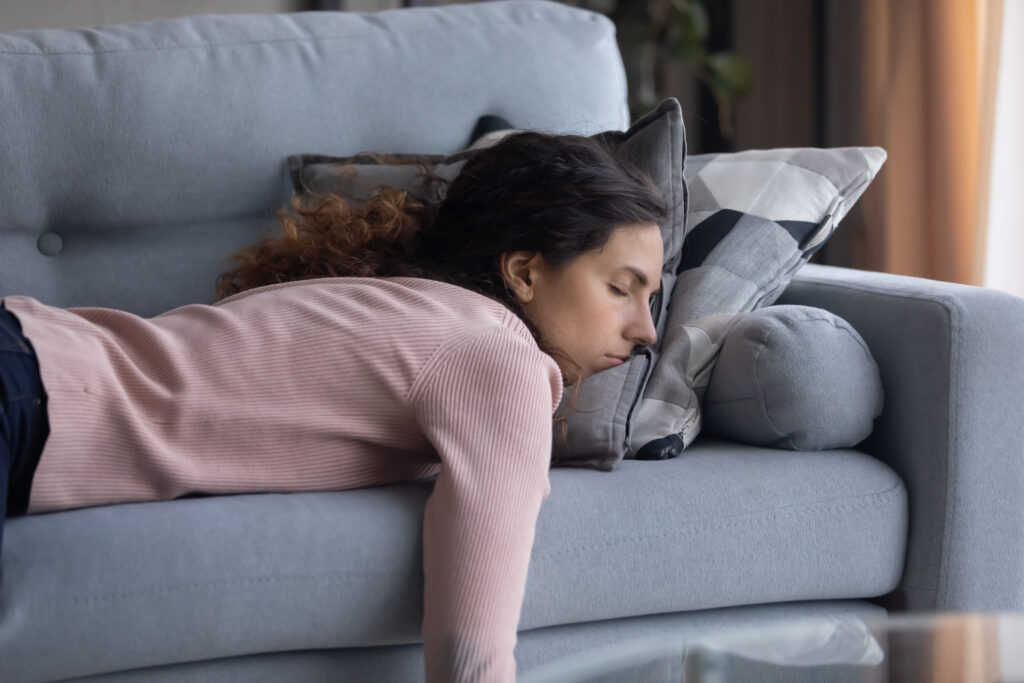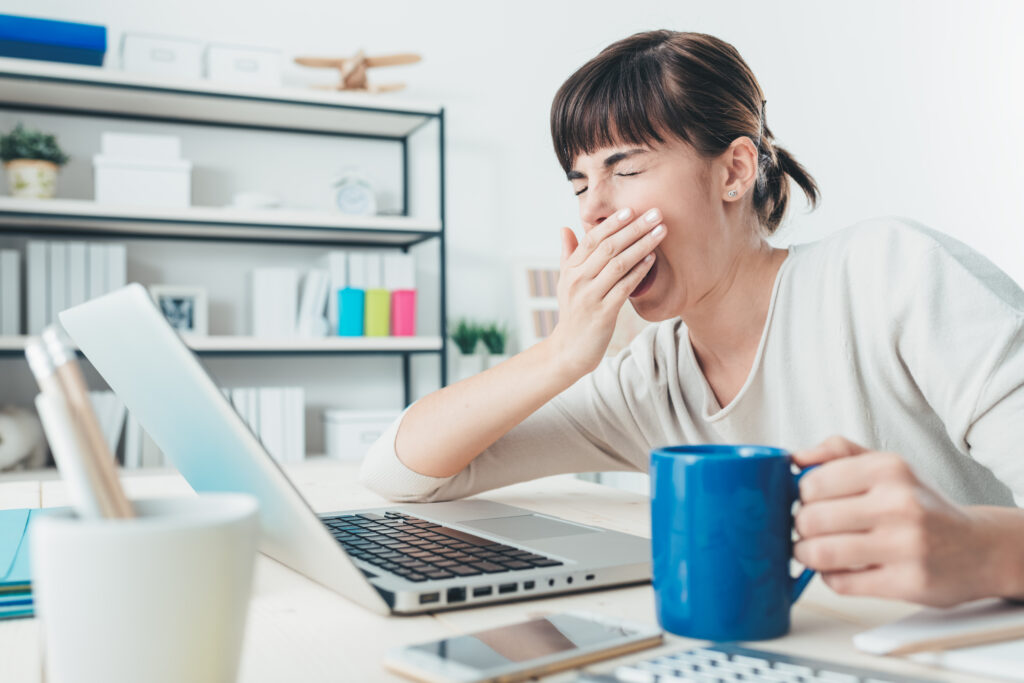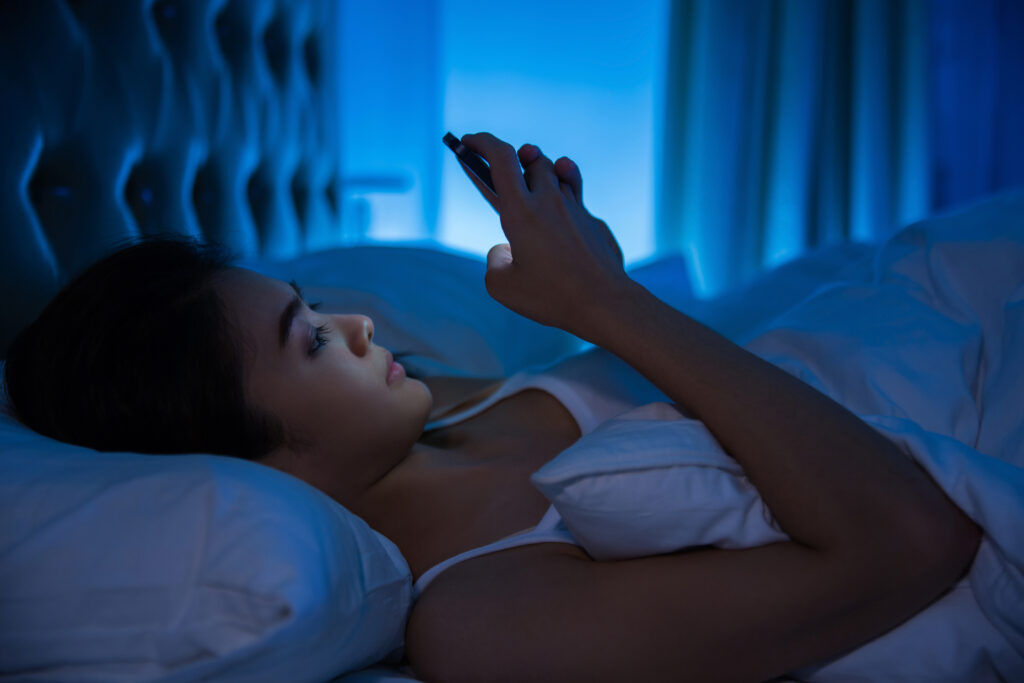March 14, 2023
Why Can’t I Sleep? 6 Reasons Why You’re Tired and Can’t Sleep
Not being able to sleep even when you’re tired can be extremely frustrating — especially if you need to wake early the next morning. Certain behaviors you practice during the day often make it harder to fall asleep at night.
Identifying and correcting these problem behaviors may help you benefit from a better night’s sleep. So, if you’ve been wondering, “Why can’t I sleep even though I’m tired?” — here are six possible culprits and some tips to help you fall asleep easier.
6 Common Reasons Why You’re Tired, But Can’t Sleep
Before you resort to sleeping pills or other medicines that promise a better night’s sleep, ask yourself whether any of the following factors may interfere with your ability to fall and stay asleep.
1. Long Naps
Taking a short nap during the day when you’re sleepy can boost your energy and refresh you. It can also improve your mood. These types of naps are known as “power naps.” They should usually last only about 10 minutes.
Taking long naps or napping at certain times of the day can make it difficult to fall asleep at night. Research shows that napping for longer than 30 minutes can make you feel groggier and more fatigued than before your nap. Sleep experts also suggest napping no later than 2 p.m. to avoid problems with falling asleep.
If you nap during the day, set your alarm for 10 minutes to avoid grogginess. Also, ensure you wake from your nap no later than 2 p.m. If you feel like 10-minute naps aren’t long enough, try wearing earplugs and an eye mask to help you fall asleep more quickly.
2. Stress and Anxiety
Thinking about stressful things at bedtime can make it difficult for you to relax. A racing mind and worrying thoughts can keep you up for hours. Stress and anxiety can also cause you to wake in the middle of the night and have difficulty falling back asleep.
When you’re experiencing stress, your body produces higher amounts of a stress hormone called cortisol. This stress hormone can interfere with your ability to relax and feel calm.
To combat stress and anxiety at night, try practicing mindfulness meditation. Mindfulness meditation involves clearing your head of all thoughts and focusing on the present moment. Focus on your breathing. Feel the comfort of your sheets and mattress. Listen to a white noise machine or relaxing music.
If your anxiety remains high, ask your doctor about treatments and other methods that can help reduce stress and anxiety.
3. Depression
Insomnia and other sleep problems are common symptoms of depression. If you can’t fall asleep even though you’re tired, you may have depression. Research shows that about 90% of people with depression also have difficulty sleeping.
Depression is a serious mental health disorder. Not being treated can lead to complications like physical pain and substance abuse.
If you think you may have depression, see your doctor right away for an evaluation. Your doctor will talk to you about your symptoms and available treatment options. Medications and talk therapy are the most common ways to reduce depression.
4. Too Much Caffeine
Caffeine stimulates your brain, energy, and attention. It can keep you up for several hours — especially if you consume it in the late afternoon or evening. Research shows that having 400 mg of caffeine within six hours of going to bed can affect the quality of your sleep. This is equal to about four or five cups of coffee.
Try drinking less caffeine during the day, or cut yourself off six hours before bedtime. For example, if you usually go to bed at 10 p.m., don’t have any caffeine past 4 p.m. Caffeine is commonly found in coffees, teas, sodas, energy drinks, and chocolates.
5. Blue Light Exposure Before Bedtime
 Blue light is the type of light emitted by screens. Devices that emit blue light include TVs, smartphones, tablets, and computers. Moderate exposure to blue light can make you feel more alert and boost your memory and brain function. This may benefit you during the day, but blue light exposure at night can prevent you from falling asleep.
Blue light is the type of light emitted by screens. Devices that emit blue light include TVs, smartphones, tablets, and computers. Moderate exposure to blue light can make you feel more alert and boost your memory and brain function. This may benefit you during the day, but blue light exposure at night can prevent you from falling asleep.
Try to avoid looking at blue-light devices within two hours of going to bed. Use other relaxation methods to help you fall asleep more easily. Listening to soothing music and reading a book are examples of activities that can help you relax and feel sleepy.
6. Sleep Disorders
Any sleep disorder can interfere with your ability to get a good night’s sleep. Insomnia is the most common sleep disorder. Research shows that insomnia affects an estimated 10% of the adult population. Another 20% of adults experience occasional symptoms of insomnia. Other common sleep disorders include narcolepsy, restless legs syndrome, and sleep apnea.
Sleep disorders are usually diagnosed and treated by sleep specialists. If you think you have a sleep disorder, you may need to participate in an overnight sleep study. During a sleep study, a sleep specialist will monitor your vitals and sleep behaviors to determine why you can’t fall or stay asleep.
Treatments for sleep disorders usually involve medications, talk therapy, lifestyle changes, and/or medical devices. For instance, if you are diagnosed with sleep apnea, your doctor may recommend losing excess weight and using a continuous positive airway pressure (CPAP) machine. These treatments can help reduce your symptoms and make you sleep better.
Getting a Good Night’s Rest
Now that you know some of the reasons behind “Why can’t I sleep at night even when I’m tired?”, it’s time to put those concerns to bed.
Request an appointment with Healthcare Associates of Texas today if you need treatment for a sleep disorder. We can evaluate and identify the root cause so you can get back to sleeping peacefully through the night.
References
- “Does Napping Impact Sleep at Night?” Sleep Foundation, September 27, 2022. https://www.sleepfoundation.org/how-sleep-works/does-napping-impact-sleep-at-night.
- “How stress can affect your sleep” Baylor College of Medicine, May 9, 2019. https://www.bcm.edu/news/how-stress-can-affect-your-sleep.
- Fang, Hong, Sheng Tu, Jifang Sheng, and Anwen Shao. “Depression in Sleep Disturbance: A Review on a Bidirectional Relationship, Mechanisms and Treatment.” Journal of Cellular and Molecular Medicine 23, no. 4 (2019): 2324–32. https://doi.org/10.1111/jcmm.14170.
- Sejbuk, Monika, Iwona Mirończuk-Chodakowska, and Anna Maria Witkowska. “Sleep Quality: A Narrative Review on Nutrition, Stimulants, and Physical Activity as Important Factors.” Nutrients 14, no. 9 (2022): 1912. https://doi.org/10.3390/nu14091912.
- “The Color of the Light Affects the Circadian Rhythms.” Centers for Disease Control and Prevention, April 1, 2020. https://www.cdc.gov/niosh/emres/longhourstraining/color.html.
- Morin, Charles M., and Denise C. Jarrin. “Epidemiology of Insomnia.” Sleep Medicine Clinics 17, no. 2 (2022): 173–91. https://doi.org/10.1016/j.jsmc.2022.03.003.
- “Key Sleep Disorders.” Centers for Disease Control and Prevention, December 14, 2022. https://www.cdc.gov/sleep/about_sleep/key_disorders.html.
- Taquet, Maxime, John R. Geddes, Masud Husain, Sierra Luciano, and Paul J Harrison. “6-month neurological and psychiatric outcomes in 236,379 survivors of COVID-19: a retrospective cohort study using electronic health records.” Lancet Psychiatry, no 8 (2021): 416–27. https://www.thelancet.com/action/showPdf?pii=S2215-0366%2821%2900084-5.
DISCLAIMER
The information featured in this site is general in nature. The site provides health information designed to complement your personal health management. It does not provide medical advice or health services and is not meant to replace professional advice or imply coverage of specific clinical services or products. The inclusion of links to other web sites does not imply any endorsement of the material on such websites.
